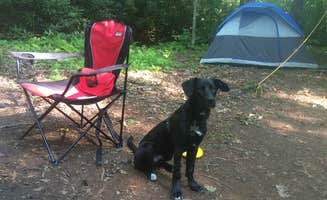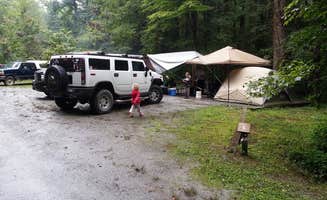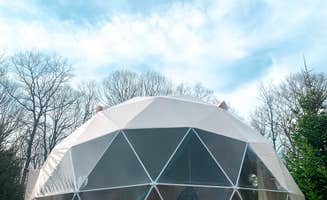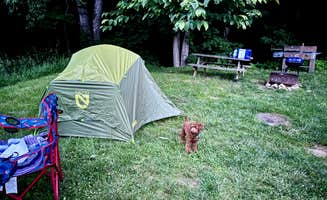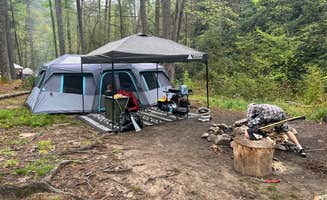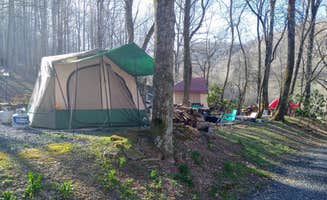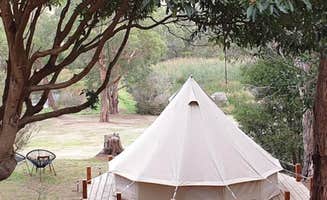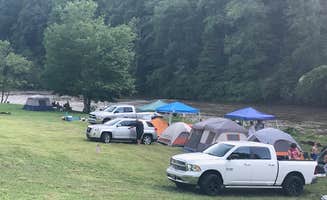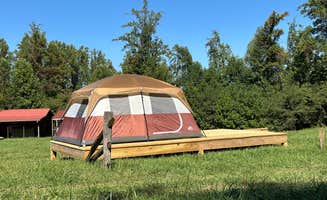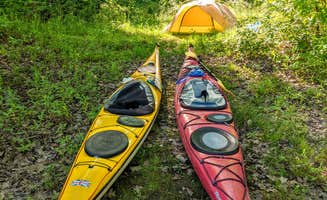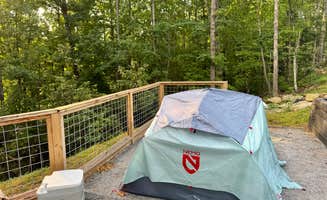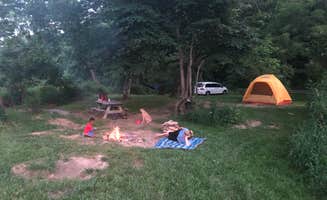Tent camping near Blowing Rock, North Carolina sits at elevations between 3,500-5,500 feet in the Blue Ridge Mountains, providing cooler summer temperatures than surrounding lowlands. During summer months, overnight temperatures can drop into the 50s even when daytime highs reach the 80s. The region receives significant rainfall, averaging 55 inches annually, with afternoon thunderstorms common in summer months.
What to Do
Waterfall hiking trails: Several tent camping areas provide access to waterfall hikes less than a mile from camp. At Mortimer Campground, "There is a 5 mile long trail that goes through the campground called Boone Fork Trail. This trail leads to Hebron falls where you can explore giant boulders and have a picnic," according to one camper.
Creek swimming holes: Many tent sites in the Blowing Rock region sit near swimming spots. "There is also an area just 1.5 miles from the Boone Fork Trail parking lot where you can go swimming and sliding off rocks," notes a visitor to Mortimer Campground. At Steele Creek, campers enjoy "a great spot to swim" with "a couple small waterfalls to add to the ambience."
Fishing opportunities: Trout fishing is available in streams throughout the area. One Blue Bear Mountain Camp visitor mentioned, "Once you get there, there is a nice creek and we caught a trout in the pond right away." Some camping areas stock ponds while others have natural stream fishing.
What Campers Like
Cooler mountain temperatures: The higher elevations provide relief from summer heat common in lower elevations. According to a Blue Bear Mountain Camp visitor, "The elevation is high so weather is nice for those trying to escape the summer heat" with temperatures "70-80 in July!"
Secluded tent sites: Many campers appreciate privacy between sites at certain campgrounds. "The sites are close enough together that we didn't have much privacy. It would be great for a family who likes lots of company," notes one Mortimer Campground visitor, helping campers choose appropriate locations based on their preferences.
Low bug pressure: Unlike many camping areas in the Southeast, some Blowing Rock area campgrounds have fewer insects. A Blue Bear visitor appreciated "The constant light breeze and lack of mosquitoes is a treat," though campers should still bring insect protection as conditions vary by location and season.
What You Should Know
Road conditions: Many tent camping areas require travel on unpaved roads. At Steele Creek, "The road is pretty well maintained other than a few spots that you have to crawl through on the corners specifically. I drive a Toyota Camry that sits fairly low and I made it fine." Always check recent road conditions before departing.
Water access: Plan ahead for water needs at primitive sites. One camper notes that Blue Bear Mountain Camp "do not have water hookups- you fill your camper tank with water at the office area." Most primitive tent sites require water filtration equipment or hauling water from developed areas.
Limited cell coverage: Most camping areas have minimal to no cell service. At Camper Mountain on Roaring Creek, "It's a bit of a drive out there with little to no cell service but wifi is available over the whole site!" Download maps and information before leaving reliable coverage areas.
Tips for Camping with Families
Look for accessible waterfall hikes: Families with children appreciate shorter trails with big rewards. A visitor to Mortimer Campground shared, "There are trails and even a waterfall within half a mile from camp," making it ideal for families with young children who might struggle with longer hikes.
Check for playground amenities: Some campgrounds offer recreational structures while others don't. A Blue Bear Mountain Camp visitor noted, "I wish there was a playground for the kids but overall it was very nice," indicating families might want to bring extra activities for children at this location.
Consider site spacing: For family camping, evaluate how close sites are to one another. "The campsites are very spaced out," reported one Blue Bear visitor, which can be beneficial for families concerned about noise carrying to neighboring sites.
Tips from RVers
Water filling logistics: For tent campers with small water containers, understanding fill station locations matters. At Plumtree Campground & Retreat, water hookups are available, while one Blue Bear Mountain Camp visitor noted their system: "They do not have water hookups- you fill your camper tank with water at the office area."
Road clearance requirements: Access roads to tent camping areas often present challenges. Mortimer Campground is "down a pretty long gravel road, so it's best to have what you need when you arrive. No quick trips to Wally World for resupply here." Planning provisions carefully prevents lengthy drives on difficult roads.
Site leveling needs: Tent campers should bring leveling equipment. "Some of the sites can be a little muddy after wet weather," notes one Mortimer Campground visitor, suggesting campers bring tarps and select tent locations carefully.


